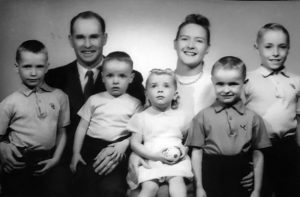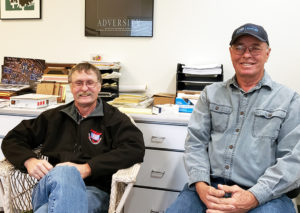
The last cow was milked on Memorial Day at the Huls Dairy barn located on Simpson Lane, northeast of Corvallis. It was the end of an era that began in 1910 when Spencer Smith Huls and his wife, Inez, began milking cows on the farm located on Sutherland Lane, directly west of the current dairy location.
The dairy at that time was a Grade B dairy which meant that the cream was more valuable as it was used for butter and ice cream. The remaining liquid, whey, was then fed to hogs on the farm. In 1924, A. Spencer Huls, Inez and Spencer, along with his wife, Marie Sutherland, joined the family farm and continued farming and milking.
In 1948, Spencer and his son, Dave, continued the tradition of a family partnership and began working together. The dairy continued operating this way until the early 1950’s when the rules governing milk production changed. By then, the family had expanded and expanded again. Now David Huls worked the farm along with his father, milking cows, raising hay and grain, and kids. The dairy became a ‘Grade A’ dairy, according to Tim Huls, one of David and Jennie’s sons.
“I don’t know if it was the first but it was one of the first Grade A dairies in the valley,” said Tim.
The milk was sold to the Missoula Community Creamery at that time. There were quite a number of Grade A dairies in the Corvallis area and so they formed Western Dairy Lines and sold their milk to Safeway in Butte for several years. Other plants that Huls Dairy shipped its milk to over the years were the cheese factory in Corvallis, the Creamery in Stevensville, Ravalli County Creamery in Hamilton, and for the past 35 years, Country Classic Dairies Co-Op in Bozeman.
Dave and Jennie’s family grew as the dairy grew. Dan, Bruce, Tim, Julie, and Jeff joined their parents in working on the farm. All graduates of Corvallis High School, some went off to college. But, as properties around the dairy were put up for sale, the boys purchased these acreages and came home to work. The work was divided up according to the property purchased as well as who was more suited to do the different duties. Dan and Bruce handled much of the farming, planting, irrigating and harvesting alfalfa and grain.
In 1977, Dave and Jennie purchased Howe’s Creamery in Hamilton. They continued the tradition of making great ice cream. In addition, they added the Hamilton House bottled milk and a full line of dairy products.
That same year, Tim and Jeff purchased the home place and continued on with the milking. There is more to milking cows than just milking them. Baby calves must be fed, replacement heifers raised and ongoing breeding. There are a lot of records to keep on all the cattle so that the best cows are kept and they are milking to their best effort. Tim’s wife, Trudy, handled much of the cattle management and then became the bookkeeper for the business.
Dave passed away in 1985 in an auto accident but the family continued on with the dairy. In 1990, the farm was incorporated into Huls Dairy, Inc. with Dan, Bruce, Tim and Jeff as the owners. The property that each of the boys owned was then leased by the corporation and the property owned as tenants in common was transferred to the ownership of Huls Dairy Inc., according to hulsdairy.com.
Working closely with family can be a good thing or it can be a bad experience. Dan said his dad had showed them how to get along and how important it was for each of them to communicate with one another. “It’s not for everyone,” concluded Dan.
The next few years was a time of expansion and improvements for the dairy. They purchased the property just to the east of the main farmstead and built a new milking barn, one that was state-of-the-art. The milking barn not only was a milking barn but also the data center for the entire dairy. Each cow had an ID and they were tracked for how much they were eating as well as how much milk they were giving. The old dairy on Sutherland Road became the nursery and place for the younger heifers. Among the many awards they received over the years, the 2000 Montana Family Business of the Year award is probably one of their most coveted. They received the award from Montana State University in the oldest family business category.
The Huls family then set upon their next project, the waste management system consisting of a methane digester, settling pond with gravity flow irrigation supplementation, solids separation facility and a generator system for heat and power. The project was completed in 2008.
The by-product of this, the solids, was bagged and marketed throughout the valley as Afterburner Boost. This garden and lawn fertilizer was also available in bulk. Dan ran this part of the operation for the most part.
“There have been times that a 100 pounds of compost has been worth more than 100 pounds of milk,” said Dan.
However, as Tim put it, the secret to any successful farmer is a wife who works in town. Dan’s wife, Joan, had worked in Hamilton for many years. Jeff also worked off the farm for Ravalli Electric Co-op.
Bruce had passed away in 2010 and their sister, Julie Huls Zsupnik passed away in 2003. Everyone was getting older and it didn’t seem as if any of the next generation wanted to take on the operation. Expenses have grown and grown but the income has not, said Tim. For the last few years, the milk has been transported to Bozeman to the Dairy Cooperative. This is a farmer-owned co-op with about 600 dairy farmers in the Northwest as members. The freight costs for 270 miles to the plant are expensive and there are more and more hoops to jump through all of the time.
The decision to stop milking cows didn’t come easily. Not only was family involved but so were about eight others, the milkers, who would lose their income.

“It’s a ripple effect,” said Tim. “Now we won’t be needing the feed stores as much, or equipment, and on down the line.”
Dan said the decision to cease milking was a difficult one to make but both Tim and Dan stressed that it was a business decision. This year, they ran out of After Burner Boost early and Dan said that more people were concerned about that than about the dairy closing. (There will be more next year.)
Even though the milk cows are gone, there are still quite a number of young stock to be fed. There are fields to planted and harvested and irrigated. Tim plans on doing quite a bit of reclamation work and cleaning around the place. Dan will become a county commissioner next January. They are all looking forward to spending a little more time with the family and maybe even traveling a little.
With the passing of Huls Dairy, there are now just two dairies left in the valley, Big Creek Dairy and Lifeline Dairy.
Tim, who has become a poet in the last few years, wrote a poem when Claire Griffin closed his dairy a few years ago. At the time he wrote the poem, “Another One’s Gone,” Tim said he knew deep down that the time would come for Huls Dairy to be ‘gone’ as well.
(“Another One’s Gone” can be found on YouTube.)